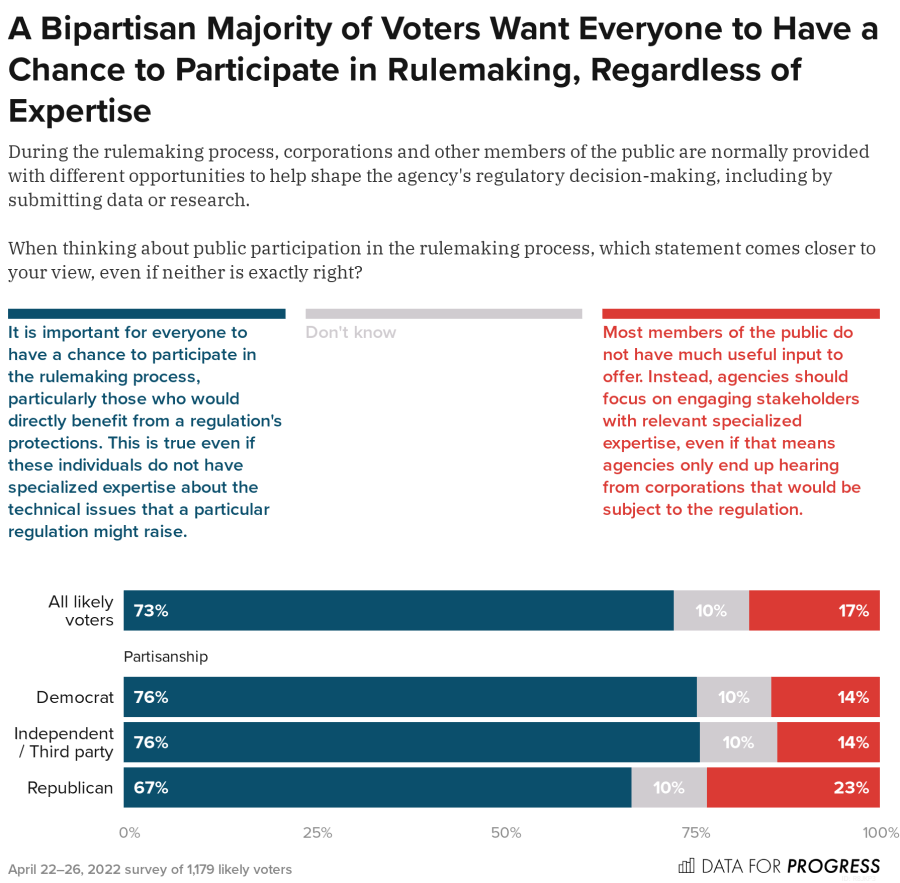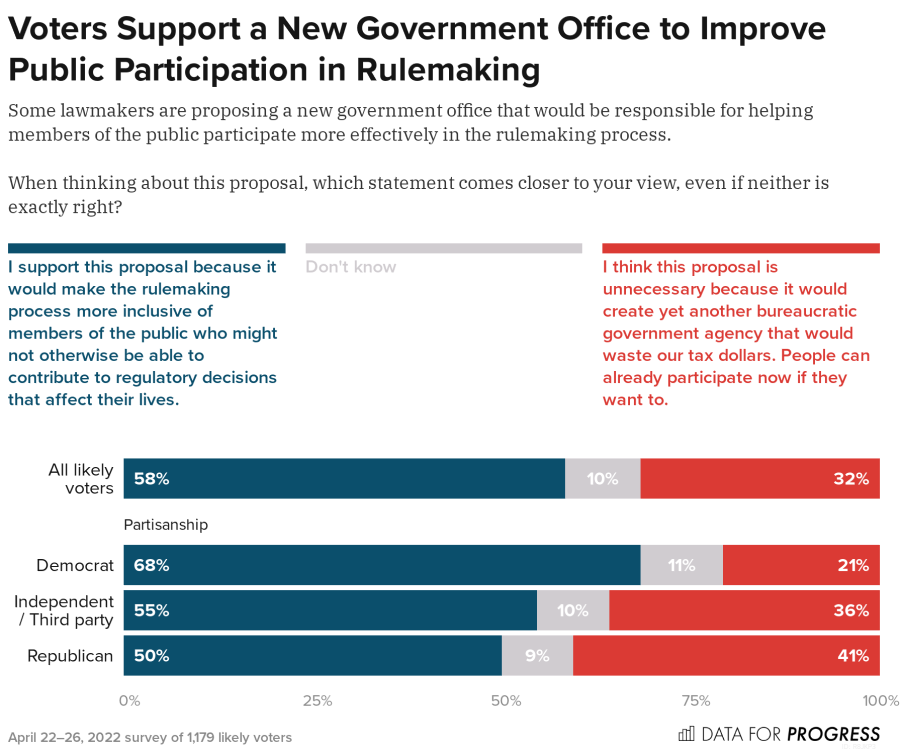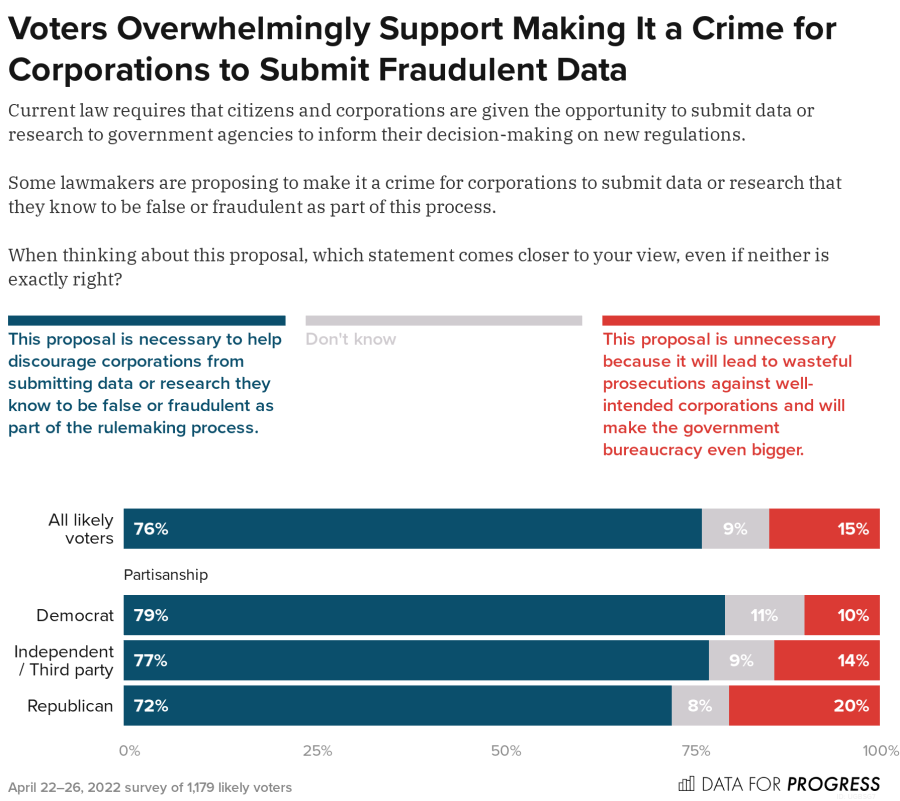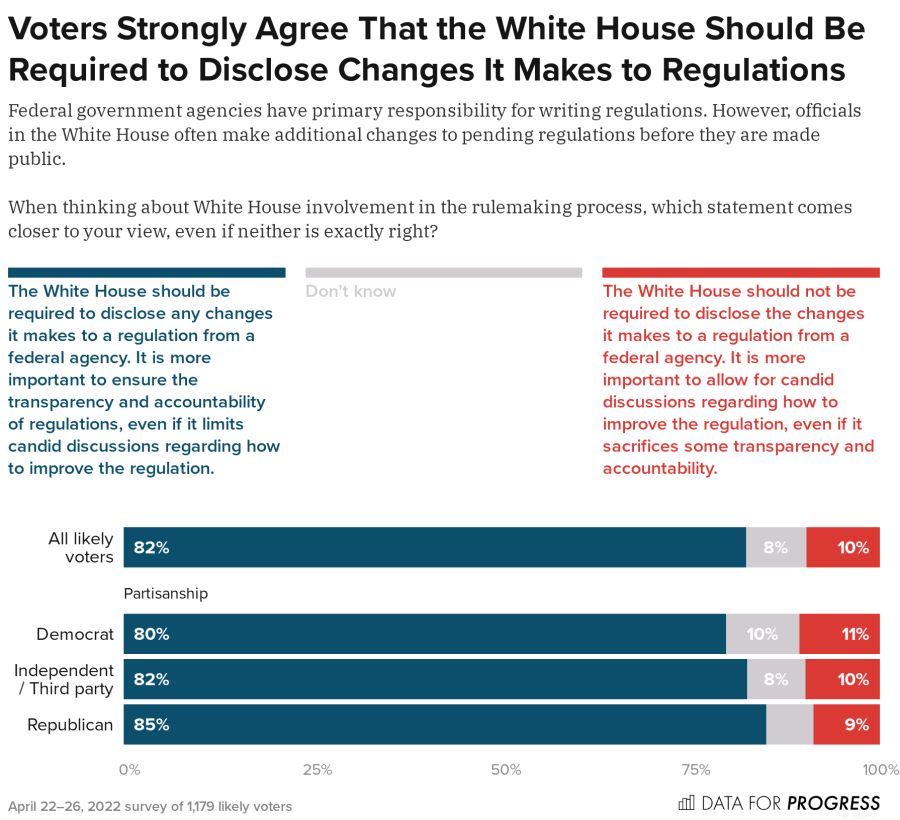June 2022
Introduction
Quick links and resources |
|
Like and share the article and polling results. |
Our nation faces several critical challenges — from climate change, to ensuring the stability of our economy, to safeguarding the public against new and emerging threats from rapidly evolving internet technology. Our regulatory system must play a vital role if we are to overcome these challenges in a manner that is effective, timely, equitable, and fair.
For over a century, the federal regulatory system has formed a crucial part of the U.S. constitutional system of governance, serving as the institutional forum in which agencies translate congressional legislation into concrete policies that meet on-the-ground challenges. Agencies must follow strict procedural rules when implementing these programs, including incorporating feedback from public stakeholders
A defining characteristic of this approach is the active role that the public plays in this process. Ongoing and meaningful engagement ensures that the resulting policies accommodate and appropriately balance competing values. It also provides an opportunity to identify and account for practical implementation challenges without unduly sacrificing effectiveness in achieving desired policy goals.

By and large, the U.S. regulatory system has served the American people well, making our lives better, our economy fairer, and each of us freer to pursue our potential than we would have been otherwise if it had not existed. Nevertheless, it can and should work better in helping us to accomplish these goals.
In recent decades in particular, the “public” has been relegated further to the margins of “public policy” as changes in prevailing practices and legal doctrines have diminished attention to regulatory beneficiaries in the “how” and the “why” of the rulemaking process. A bill currently pending in the U.S. House of Representatives called the Stop Corporate Capture Act (H.R. 6107) seeks to reverse this trend by recalibrating “the rules for how we make rules.”
In April 2022, Data for Progress surveyed 1,179 likely voters nationally to measure public attitudes toward several of the key provisions in the Stop Corporate Capture Act. The results found broad support across the political spectrum for these proposed changes to the regulatory system. These results suggest that legislation aimed at modernizing the regulatory system by making it more inclusive and equitable would not only improve its performance, but also but also increase public confidence in this critical part of our government.
Empowering the Public
Public participation has long been a defining feature of the U.S. regulatory system. It is most notably enshrined in the Administrative Procedure Act, the 1946 law that establishes the ground rules for how we make regulations and which the Stop Corporate Capture Act seeks to modernize. That law includes a notice-and-comment requirement that directs agencies to seek out and consider the public’s input when developing new rules. Over time, we have learned a great deal about how the notice-and-comment process works in practice and how it fails to adequately engage many members of the public with a stake in a specific rulemaking — particularly individuals from structurally marginalized communities.
One of the biggest barriers to participation is that much of regulatory decision-making has become highly technical and specialized — involving complex questions of science (e.g., determining whether and how a chemical might cause cancer in exposed humans) and technology (e.g., how we can re-engineer automobiles so they emit less air pollution). By a +56-point margin, likely voters nevertheless believed that it was still important for members of the public to participate in the rulemaking process, even if they lack specialized expertise about the technical issues that a particular regulation might raise. Polling respondents generally shared this view regardless of their identified political affiliation (by a +62-point margin for Democrats, +62-point margin for Independents, and a +44-point margin for Republicans).
The survey also asked respondents about two provisions in the Stop Corporate Capture Act meant to address such barriers and make the regulatory system more inclusive. Significant majorities of Democrats (68 percent in favor compared to 21 percent opposed), Independents (55 percent in favor compared to 36 percent opposed), and Republicans (50 percent in favor compared to 41 percent opposed) supported the bill’s creation of a new government office charged with helping members of the public participate in the rulemaking process.
Respondents also supported by a +38-point margin (62 percent in favor compared to 24 percent opposed) a provision in the bill that would provide the public with more opportunities to bring corporations to court in order to hold them accountable for regulatory violations. This broad support held for Democrats (by a +50-point margin), Independents (by a +32-point margin) and Republicans (by a +29-point margin).
Ending Corporate Manipulation
To be sure, empowering the public is only one part of the broader effort to create a regulatory system that is truly people-driven. The other part is to root out improper influence by corporate special interests that are able to leverage their superior resources to dominate every aspect of the policy implementation process.
One area that corporate interests have long dominated is the notice-and-comment process, which invites the public to weigh in on what rules should look like or if they should be issued at all. As regulatory decision-making becomes an increasingly technocratic exercise, the submission of scientific research by participants in the rulemaking process has taken on greater importance. Not surprisingly, corporate interests submit the vast majority of such research. The purpose of these submissions, of course, is to support a particular corporate interest’s preferred policy outcome. So, for example, if an agency is considering a rule to limit the use of a particular chemical, the manufacturer of the chemical is likely to submit research showing that the chemical is not harmful to human health or the environment and therefore does not merit stringent regulation, if any at all.
Given the strong incentives for corporate interests to dictate the debate over policy-related science, it is natural to question the scientific integrity of the research they submit during the notice-and-comment process. Indeed, high-profile examples of corporate interests manipulating science in self-serving ways — such as the fossil fuel industry’s efforts to downplay the risks of the climate crisis or opioid manufacturers’ campaign to conceal the addictive nature of their products — has only reinforced public concerns about the legitimacy of industry-backed science. These concerns were reflected in the polling results, with respondents agreeing by a +36-point margin that they were less likely to trust a scientific study submitted by a corporation due to the corporation’s financial interests in the outcome of the rulemaking. This pattern of distrust held across the political spectrum (by a +40-point margin for Democrats, by a +47-point margin for Independents, and a +25-point margin for Republicans).
Such distrust does not mean that corporations should not be able to submit scientific research as part of the rulemaking process. It does, however, indicate that stronger controls on such research are warranted in order to promote public confidence. In turn, the use of such controls would likely strengthen the public’s confidence in the outcomes of the rulemaking process overall.
The Stop Corporate Capture Act would establish several controls aimed at improving public confidence in corporate-submitted science. The survey asked respondents about four relevant provisions in the bill. By a +73-point margin (82 percent support vs. 9 percent opposition), respondents supported a provision in the bill that would require corporations to disclose whether they provided significant financial support for studies they submit during the rulemaking process. This broad support held across the political spectrum (by a +77-point margin among Democrats, a +80-point margin among Independents, and a +65-point margin among Republicans).
Respondents also supported by +74-point margin a provision in the bill that would require corporations to make any scientific research they submit during the rulemaking process fully available to the public for independent review and verification if they provided significant financial support toward the study. Significantly, Democrats supported this provision by a +77-point margin, and Independents supported this provision by a +80-point margin, while Republicans supported it by a +68-point margin.
Likewise, respondents supported by a +74-point margin a provision in the bill that would require corporations to disclose whether, for any studies they submit, they had an opportunity to exercise editorial control by reviewing and editing the study’s contents prior to publication. This provision received broad support from across the political spectrum, with Democrats supporting it by a +79-point margin, Independents supporting it by a +76-point margin, and Republicans supporting it by a +68-point margin.
Even with such strong controls in place, “bad actor” corporations might still attempt to submit false information to regulatory agencies during the rulemaking process. For instance, during a rulemaking proceeding, a corporation might submit a study purporting to show that the compliance costs of the proposed rule would undermine its economic viability, leading to lost profits and significant job loss. At the same time, that corporation might provide a different, more accurate study to its shareholders that demonstrates how those compliance costs could be easily absorbed without affecting profits or employment.
For such situations, the Stop Corporate Capture Act would make it a crime for corporations to submit research or studies that they know contain false information. Respondents supported this provision by a +61-point margin. The provision was strongly supported by Democrats (by a +69-point margin), by Independents (by a +63-point margin), and Republicans (by a +52-point margin).
Prioritizing Equity and Agency Expertise
Regulatory decision-making is not like solving an equation or following a cake recipe. Rather, it is often a complicated process that requires resolving difficult tradeoffs among competing and sometimes irreconcilable values and concerns. For instance, the public may strongly support a regulation requiring public transportation to be wheelchair-accessible, even if it is difficult and expensive to achieve in practice. In this case, shared values regarding human dignity and equity take priority over competing cost concerns. Complicating things further, how these kinds of tradeoffs are resolved may vary from rulemaking to rulemaking.
Making these kinds of decisions when developing new regulations is never easy. But it can be made easier through a process that is deliberative and iterative and that recognizes the need for sound judgment in the face of incomplete information. Fortunately, the design of our rulemaking process largely embodies these qualities. Yet, even here, it can be improved and modernized. The Stop Corporate Capture Act seeks to do just that, particularly with regard to giving greater prominence to equity and independent expertise in regulatory decision-making.
Equity. When agencies develop new regulations, they typically attempt to document and account for the rule’s potential impacts — both good and bad — using a particular evaluative methodology called “cost-benefit analysis.” The results of these analyses can greatly influence how the rule is designed or if it is completed at all. A defining attribute of cost-benefit analysis is that it only accounts for those impacts that can be reliably reduced to dollars and cents. The upshot is that this approach excludes important values such as equity and justice simply because they cannot be captured in monetary terms. For example, a cost-benefit analysis for a rule that seeks to prevent racial discrimination in bank lending would potentially find that the rule produces $0 in benefits.
The Stop Corporate Capture Act would address this shortcoming by directing agencies to consider as many of a rule’s impacts as possible, regardless of whether they can be readily described in monetary terms. The survey found strong support for this provision among respondents (by a +62-point margin). Significantly, the provision was popular with Democrats (by a +65-point margin), Independents (by a +64-point margin), and Republicans (by a +57-point margin).
Independent Agency Expertise. By law, Congress assigns the responsibility for writing rules to agencies, such as the U.S. Environmental Protection Agency and the Food and Drug Administration. Before rules are officially released to the public, they undergo a formal review process at the White House, during which officials working under the president often make significant changes. The changes that White House officials make, however, are often motivated by political factors that agencies are legally prohibited from considering. Another problem is that these changes are rarely disclosed to the public, creating the false impression that the agency — not the White House — determined the final rules.
The Stop Corporate Capture Act would reform the White House review process to better shield agency expertise from improper political interference. By a +72-point margin, respondents supported the bill’s requirements that the White House disclose any changes it makes to a draft rule during the formal review process. This provision enjoyed even stronger support from Republicans (+76-point margin) and Independents (+72-point margin) than from Democrats (+69-point margin).
Conclusion
The U.S. regulatory system plays an important role in our government and will continue to do so as we tackle new and emerging social challenges and continue working toward our founding goal of forming “a more perfect union.” Consequently, we must review how our regulatory system is working to ensure it is functioning as well as possible and is living up to the expectations of the public it serves.
The Stop Corporate Capture Act is an important opportunity to modernize the regulatory system — and place the public more squarely as its focus of concern. The polling results described above indicate strong public support for this effort. Indeed, each of the bill’s provisions covered in the survey enjoyed considerable popularity with respondents across the political spectrum. With strong support from both Democrats and Republicans, the bill offers a rare opportunity for bipartisan action on improving the performance of our government, even in the midst of the highly polarized political climate that now characterizes Congress.
Methodology
From April 22 to 26, 2022, Data for Progress conducted a survey of 1,179 likely voters nationally using web panel respondents. The sample was weighted to be representative of likely voters by age, gender, education, race, and voting history. The survey was conducted in English. The margin of error is ±3 percentage points.
N=1,179 unless otherwise specified. Some values may not add up to 100 due to rounding.











